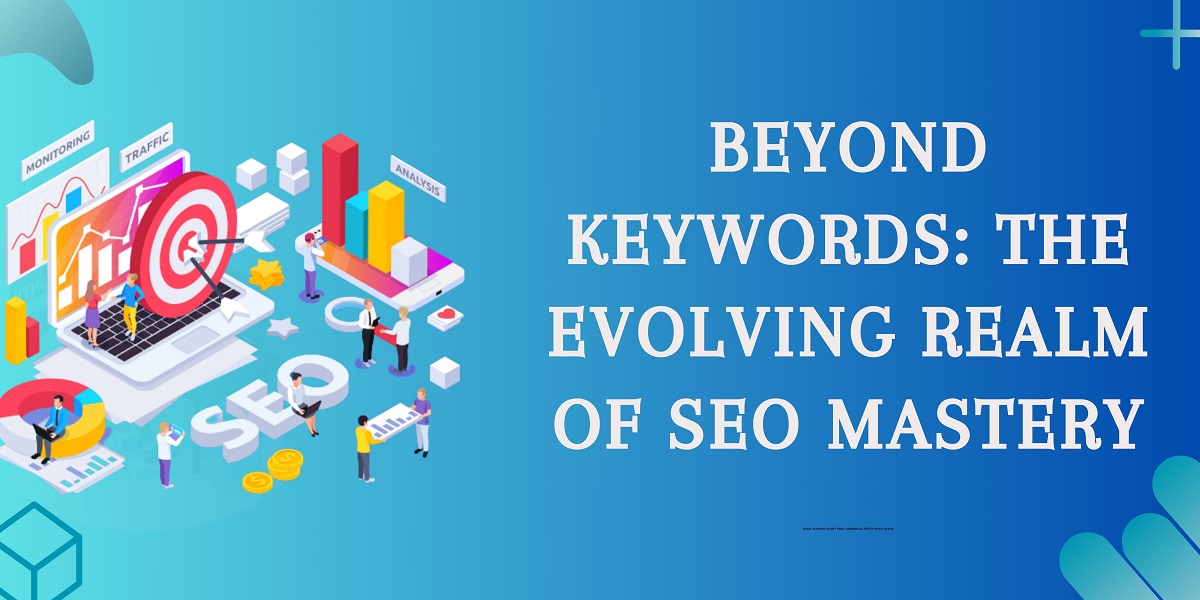
Beyond Keywords: The Evolving Realm of SEO Mastery
- By Karan Sharma
- 24-01-2024
- SEO
Search engine optimizers are wise wanderers in the digital world, dipping themselves into every round of changes to search engines. So, we aren’t here simply to discuss keywords. However, in this article, you will learn about a realm where SEO has the potential to be an equalizing factor all over the virtual space.
Back in the day, it was keywords that were everything. You had to come up with just the right ones and then find some way of dropping them into your copy to attract search engine spiders' notice. But those restrictions on keywords haven't succeeded in grounding the wings of SEO.
Of course, the truth today is that you can't simply choose words. It's all about developing an online program to guide your website or the content you are putting out on the Internet. Today, the scope of SEO encompasses user experience, content quality, adapting to different digital circumstances, and answering your consumers’ questions on several digital platforms.
That’s why SEO Toronto experts say you need to be prepared to face a constantly transforming, evolving, and responsive SEO universe. You must explore the keywords behind the veil of search engines. So, let’s begin!
The Shift from Keywords: Understanding the Evolution
In recent years, keywords have been the stars of the SEO show. Many sites attempt to stuff every conceivable keyword into their pages in the hope of achieving high search engine results. Search engines treated it like a game of hide and seek- Stuff more keywords, climb higher. However, times have changed, so don't get too excited.
Today, the story is different. The online world has undergone a huge transformation, and search engines are getting smarter. You can't just insert some keywords because it's no longer just about that. The big search engines, like Google, have even come down to figuring out intent and context.
This has changed the way that many search engine optimizers do business. Now, besides the actual keywords themselves, what's equally important is to know why people search for certain phrases and what they want to find, just like the change from a keyword-centric model to a user-centric model.
In addition, search engines are regularly evolving. From relying simply on keyword matches, they now combine this with a value judgment of content. So forget about the right keywords; you have to offer content that truly answers users’ questions, that has value, and that is engaging and authoritative. It's almost like shifting from a list of keywords to authentic content that appeals to your readers.
But there is also the emergence of voice search and natural language processing. Now that voice assistants are available, however, people aren't typing search terms like they used to. People ask questions conversationally, and search engines give them answers. This has shifted the focus of search engine experts from optimizing around keyword phrases to optimizing for the language of conversation.
Content Quality and Relevance: Cornerstones of Modern SEO
Those days are gone when SEO was just about the race for keywords. Now, it is more like a marathon where quality and relevance are the winner's prizes. So not only do they count the number of keywords, but they also want to provide users with the most appropriate content.
You must know that quality content isn't producing extensive word dumps that are thick with keywords. What it really means is creating material that's fascinating, not just dry information. It's like preparing a meal; you want it to be tasty rather than full. After all, search engines need content that grabs users 'attention, is educational, and strikes a chord. In the end, they try to help users get the most useful and relevant responses to their questions.
And here’s the kicker – relevance. Picture yourself looking for a recipe and finding yourself on a page that starts off discussing what to do about a bum car. Not cool, right? The same goes for search engines. What they want is for your content to coincide with what the users are looking for. So, relevance is key. Your content must be like a matchmaker, fitting in with what users want and need.
Additionally, quality and topicality are linked. Good content addressed directly to user intent will be more likely to rank in a search engine because it makes a lasting impression.
However, it's not only about writing interesting content; it's also about enhancing it. You should focus on quality over quantity. That’s the mantra here. Keeping the content on your site fresh demonstrates to search engines that your site is providing up-to-date information.
Technical Search Engine Optimization and Usability
Picture this: When you go online to find something, have you ever thought about how those ranked number one got there? That’s where technical SEO comes into play. All you can do is optimize the structure of your website, it's crawling, it's indexing, and a bunch of more technical things to make search engines see your sparkle.
The crucial thing is not to please the search engines but to please your visitors. This, of course, is where user experience (UX) comes into play. UX is like rolling out the red carpet for your website visitors. In short, it is all about a smooth, enjoyable, hassle-free journey through your site.
Just think what it would be like visiting a web page that never loaded or was impossible to navigate. Frustrating, right? Search engines hate that, too! This is because they hope to show people places where they are likely to have a good time. Thus, speed, ease of use, and a mobile-friendly website are not only good for the user but are approved by the search engines.
Technical SEO is closely linked to UX. This is because when your website is technically good and offers an excellent experience, it becomes like a great party everyone wants to attend. Search engines can see this, too, and they will be more likely to direct users looking for related information to your site.
The Model Lessons From Semantic SEO and Natural Language Processing (NLP)
In the days when less was more in search engine optimizations, keyword selection, and stuffing were the name of the game. However, don't telephone just yet-things have changed! But now search engines, such as our local Google, are no longer just looking for certain words; they are decoding the whole conversation.
Semantic SEO and NLP are like a fan of language. Semantic SEO is all about the meaning behind the words. Finding one keyword is not enough; the whole context and purpose of a user's request must be analyzed. Thus, if one inputs “best coffee shops,” search engines won’t simply find all the cafes, instead finding the best spots within the general context of your search.
Then there is Natural Language Processing, the hot technology that allows search engines to read the language the way people speak it. Or have you ever asked a voice assistant for advice or searched by voice inputs directly into your phone? That's NLP applying itself, understanding the way users speak, and providing an accurate response.
Now, why does this matter? That's because, for them, searching is like speaking to a naive friend using questions or even slang.
What this means is that search engineers have changed the game from focusing on words to a focus on content that responds to questions and issues, solving problems and bringing people information on a natural, everyday level. You are chatting with your listeners, not just giving knowledge.
Beyond Search Engines: SEO in Multi-Channel Environments
The early days of SEO seemed to revolve entirely around optimizing for the search engine, be it Google, Bing, or others. But guess what? The digital universe has truly opened up. People no longer rely only on search engines to find what they want. They're skimming through social media, watching videos, surfing the web, and so on.
This change has created a new space for search engine optimizers-the multi-channel world. These channels are like different stages that your audience spends time on. There are social media (Facebook, Instagram, Twitter), video-sharing sites (YouTube), and voice search platforms. It is like having many different doors opening up.
In these multi-channel worlds, what are the latest rumors concerning search engine optimization? After all, it's about going wherever the audience is and being wherever they need you. Being where your audience is more than just being up there on the search rankings page; it's in social media feeds, video recommendations, app stores, and voice assistants.
Imagine this scenario: If you only appear in search engines while your competitors are making the rounds on social media, then you, too, are losing out. It is just at that point that optimizing for multi-channel environments comes to the rescue.
But this form of search engine marketing means you need to get to know the unique feel of each of these platforms. Alongside this, make decisions about your content, keywords, and overall approach that consider each channel. You could say it is like understanding the language of Instagram while getting the beat of YouTube or Twitter. Adaptation to different digital habitats is simply the nature of the game.
However, it's not only a matter of being omnipresent; it is also a matter of being omnipresent for a reason. The formula is to tailor your material on each platform as per your audience. It's about making the experience of being you as seamless to the user.
The Age of SEO Mastering
A few years ago was the golden age for weaving tricks into your site's code. Now, they stop turning to search engines only when the machines can't help them. They browse the web, watch videos, and check out app stores.
But you've also entered multi-channel environments into a universe where your audience resides. They're more than spots; they are online communities. The digital world is made up of many different elements-platforms such as Facebook and Twitter and video platforms like YouTube or TikTok etc.
So, what are the links to SEO, then? First of all, it's not enough anymore to be number one on Google or Bing. That is to say, you tell your story wherever the people are. On Instagram as they surf through stories or on YouTube when highlighting recommended videos.
Imagine having a fabulous product or service available only on search engine pages. Many people find out through these other channels, so a lot of customers would be lost. This is where multi-channel network optimization comes in.
The trick to this unfamiliar turf is mastering them all. Promoting on the web is like studying foreign dialects; you just have to learn a different style for each. The art of being multicultural is to interact with your audience's world.
But the key to making sure your content resonates with your target audience should be a secret that only you understand. This is because that is on the minds of users whether they have found your site in a search engine or on social media.
Wrapping Up
With this adventurous journey through the world of search engine optimizing now complete, that truth couldn't be plainer to see. The problem is, Search Engine Optimization isn't what it used to be. It was originally just another ordinary SEO mission, but it has already changed quite fast.
On this journey, you have witnessed how the age of the keyword has itself become a kingdom of diversity. Nevertheless, having the right user keywords is not all it takes. Second, they must be interesting and useful to the user.
In the end, learning to do SEO is all about being on a road that has no end. With the digital landscape constantly changing, your SEO approach must change with it. It's simply a matter of flexibility and precision. Still more relevant is the problem of keeping pace with constant changes in algorithms and Internet trends.
But in the constantly shifting world of digital, it's search engine optimization that holds open the doors to success. But it's not enough just to march one in front of the other. What you want is people and all sectors of the Internet, leaving an amazing track across many areas.
Recent blog

Unlocking the Future: Exploring Extended Reality Hardware Market
Technology | 26-04-2024
Crafting Eye-Catching Instagram Reels In Just 9 Easy Steps
Social Media | 25-04-2024.png)




